Landmark moments for LGBT history in 2018
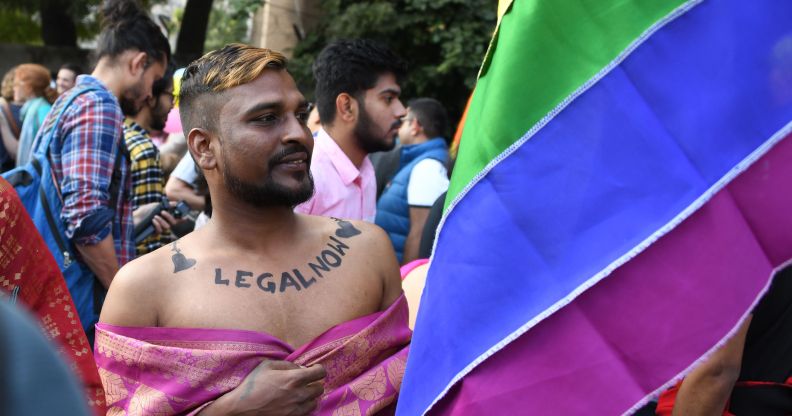
A participant in the first Indian pride parade since gay sex was decriminalised (Dominique Faget/AFP/Getty)
The year 2018 will no doubt go down in LGBT+ history with several landmark moments changing LGBT lives.
India’s Supreme Court repealed a British colonial era-rule criminalising gay sex
The historic decision on September 6 not only freed the country’s 1.3 billion people of the threat of life in prison for consummating consensual homosexual relationships, but it also revitalised the fight for LGBT+ rights in nearby countries, such as Singapore, and further afield, like in Kenya.
The landmark decision will not overcome the stigma surrounding homosexuality overnight, and LGBT+ people continue to faces various forms of restrictions and persecutions across the world.
Yet LGBT+ rights have advanced in small and big steps in the past 365 days—and as American voters elected the largest-yet contingent of LGBT+ lawmakers in the midterm elections this year, there are reasons to hope for more steps to come in 2019.
Here are the landmark moments of 2018 worth celebrating and remembering.
LGBT+ history in communities: new and first points of pride
Pride parades have coloured new parts of the world in 2018, starting in Myanmar in January, when the country saw thousands of people attending its first-ever public LGBT+ festival.
Over the course of the year, the rainbow community claimed rights and visibility from the glaciers in Antarctica to the Caribbean shores of Barbados and Guyana.
In New Zealand, pride festivities this year were particularly eventful. Auckland Pride march saw for the first time the participation of the country’s prime minister, Jacinda Ardern, and was also the first pride parade in the country to feature the same-sex wedding of a lesbian couple.
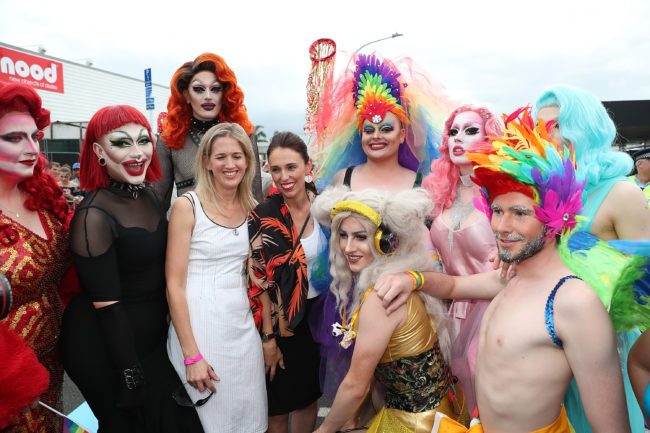
New Zealand Prime Minister Jacinda Ardern became the first Kiwi leader to take part in the Auckland Pride Parade in 2014. (Fiona Goodall/Getty)
More community-specific parades have also emerged. Trans rights supporters marched for the first time in the streets of Belfast in Northern Ireland in June and Dublin in the Republic of Ireland in July.
Those who identify as bisexual and their allies instead held a pride march in Los Angeles in September in what is believed to be the first-ever city-wide Bi Pride in the US.
LGBT+ history for trans representation: Awarded at last
While the UK was engulfed in a debate around self-identification of transgender people for most of the year as part of a public government consultation on reforms to the Gender Recognition Act, similar reforms were approved in Uruguay and in Chile.
The year opened and closed with landmark moments for the transgender community working in the entertainment industry. In January, Yance Ford became the first transgender director to earn an Academy Award nomination for Best Documentary Feature.
Ford did not ultimately win the honour, but the Oscars still represented a landmark moment for transgender representation when Chilean actress Daniela Vega became the first transgender person to present an award at the ceremony and the movie she starred in, A Fantastic Woman, also won the prize for Best Foreign Film.
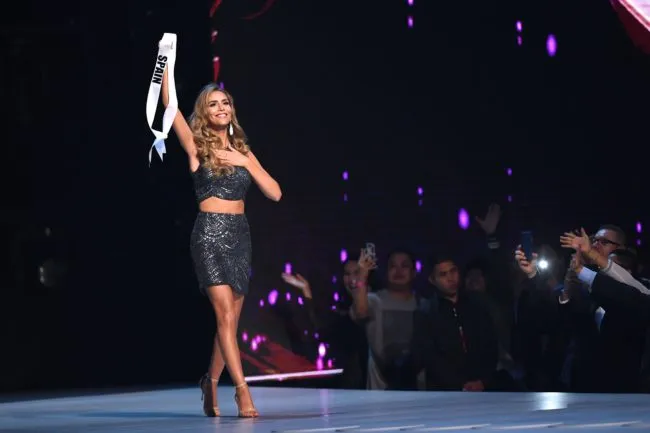
Angela Ponce made several statements in support of trans rights ahead of Miss Universe (LILLIAN SUWANRUMPHA/AFP/Getty)
In December, the Miss Universe beauty pageant featured a transgender woman as one of the contestants for the first time—beauty queen Angela Ponce, who already made history in her native Spain by winning the national title in July.
In Pakistan, a country where the transgender community faces prejudice and violence, there were particular milestones to celebrate with regards to their presence in the workforce. A TV channel appointed a transgender newsreader for the first time, while the government hired its first-ever openly transgender employee.
LGBT+ history in Parenthood: A global fight for rights
The legal and societal recognition of LGBT+ families is yet another goal on the path to full equality. In Croatia, a book celebrating and normalising parents of the same gender proved a success, selling out its first 500 copies upon launch.
In various countries where a legal vacuum on IVF and surrogacy for LGBT+ people persists, it has become the role of the courts or local authorities to make landmark rulings in the best interests of the child.
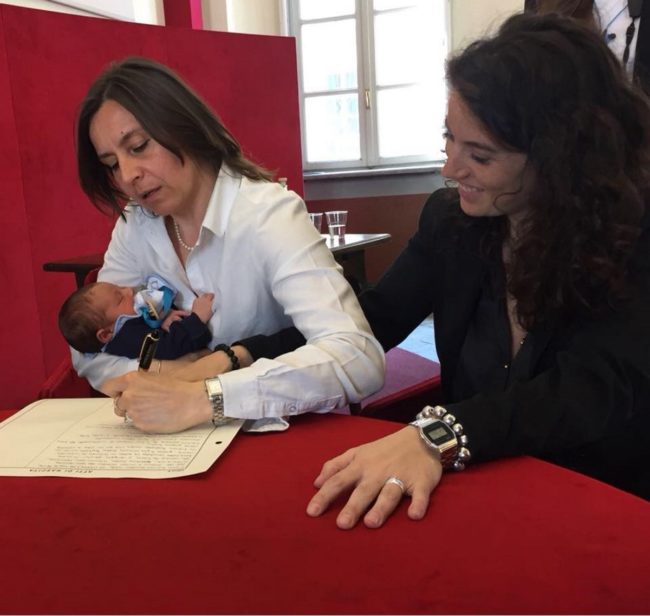
Italian lesbian couple made history declaring both their names as mothers of their newborn baby, conceived through IVF. (chiara foglietta/Facebook)
This was the case in Italy, where a lesbian couple convinced local authorities to recognise their child, born out of IVF, as officially having two mothers.
In Israel, where the exclusion of gay parents from a reform of surrogacy law sparked a nationwide strike this summer and inspired an activist to launch the country’s first LGBT+ party, a court agreed with a gay couple that allowing only one of the adoptive parents’ names on the child’s birth certificate was a discriminatory practice.
LGBT+ history in the Royal family: Not that kind of wedding
This year the British royal family significantly grew in size.
A third royal baby was born, Prince Harry got hitched and Lord Ivar Mountbatten, a cousin to the Queen and the great-nephew of Earl Mountbatten of Burma, who came out as gay in 2016, wedded his long-term partner James Coyle.
While no member of the royal family attended the wedding, his ex-wife Penelope Thompson walked by his side to give him away at the altar.
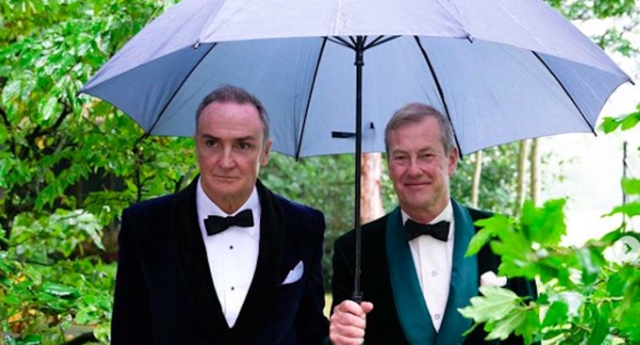
Lord Ivar Mountbatten (right) uploaded a photo on Instagram of him and his husband James Coyle on their wedding day. (ivar_mountbatten/Instagram)
Queen Elizabeth II appeared to celebrate Pride month by flaunting a rainbow flower decoration on her hat to Royal Ascot—earlier that month, she had also made her first appearance with the first-ever openly gay footman to serve the monarch.
Ollie Roberts, a 21-year-old who has previously served in the Royal Air Force, was appointed to the role of personal footman to the monarch in June. He reportedly quit his job after being demoted from his position because of “courting publicity” a few months later.
LGBT+ history in sports: No kicking around
Sports remains a largely hostile environment for LGBT+ people to thrive in their authentic selfs. Two leading footballers playing in the British Premier League, Arsenal’s Héctor Bellerín and Chelsea’s Olivier Giroud have both said as much about football in recent interviews this year.
This is why is all the more remarkable that football player Collin Martin, who plays for Minnesota United in the MLS, decided to come out as gay this year posting a picture of himself wrapped in a rainbow flag. Martin is now the only out gay football player in a top professional soccer league.
In other sports, LGBT+ athletes have been able to show their excellency. On the sparkling surface of the ice rink, American figure skater’s Adam Rippon shined brightest, becoming the first openly gay man to qualify for the Olympics.
Rippon’s fellow Team USA athlete Gus Kenworthy, who came out in 2015 and competed in the Pyeongchang Winter Olympics as an out gay man, made television history when he kissed his boyfriend live on NBC’s international broadcast.
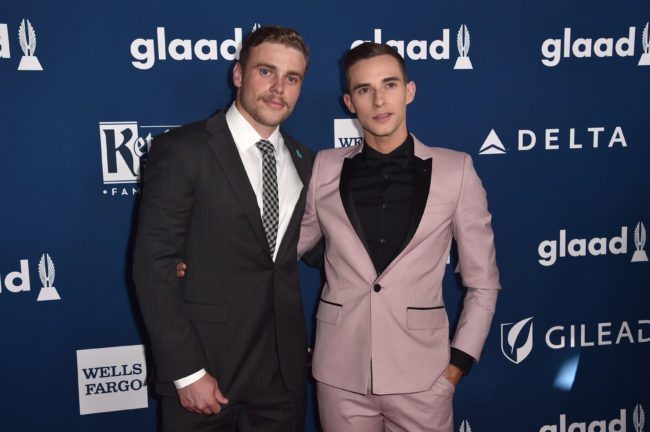
Gus Kenworthy and Adam Rippon attend the 29th Annual GLAAD Media Awards (Alberto E. Rodriguez/Getty)
Even in the fighting sports, LGBT+ athletes have pulled all the right punches. Pat Manuel became the first transgender man to fight and win at a professional level in US boxing and WWE’s first openly lesbian wrestler Sonya Deville—real name Daria Berenato—competed in the first-ever WrestleMania women’s battle royal at the event.
In more strides for LGBT+ history in sports, assistant philosophy professor Rachel McKinnon won gold in the sprint at the 2018 UCI Masters Track Cycling World Championships, becoming the first transgender woman to win a world championship in cycling.
Traditional gender roles have been subverted in cheerleading, too, with male cheerleaders performing in the National Football League (NFL) for the first time this year.
The NFL also recorded a landmark moment when it joined the Major League Basketball to march at the New York Pride for the first time.
In yet another first, 59-year-old retired Dallas Cowboys player Jeff Rohrer became the first gay NFL player to marry a man when he tied the knot with his fiancé Joshua Ross in November.
Here’s to more progress in 2019.

